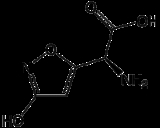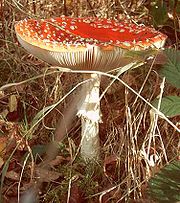
Ibotenic acid
Encyclopedia
Ibotenic acid is a chemical compound
that is naturally occurring in the mushrooms Amanita muscaria
and Amanita pantherina, among others. Ibotenic acid is a powerful neurotoxin
that is used as a "brain-lesion
ing agent" and has shown to be highly neurotoxic when injected directly into the brains of mice and rats.
In 1960s, ibotenic acid was originally isolated from Amanita ibotengutake in Japan
. A. ibotengutake is very like to A. pantherina.
 When ibotenic acid is ingested, a small portion is decarboxylated into muscimol
When ibotenic acid is ingested, a small portion is decarboxylated into muscimol
. Ibotenic acid evokes entheogen
ic effects in human beings at doses in range of 50-100 mg. Peak intoxication is reached approximately 2-3 hours after oral ingestion, consisting of one or all of the following; visual distortions
/hallucinations, loss of equilibrium
, muscle twitching (commonly mislabeled as convulsions), and altered sensory perception
. These effects generally last for 6-8 hours, varying with dose.
and Amanita pantherina) is a common factor in shamanic rituals, used as a sacrament. Muscimol is excreted unchanged in the urine in relatively large amounts, and there are stories of shamans "reusing" urine for intoxication purposes, or the rest of the tribe making use of the shaman's urine.
Chemical compound
A chemical compound is a pure chemical substance consisting of two or more different chemical elements that can be separated into simpler substances by chemical reactions. Chemical compounds have a unique and defined chemical structure; they consist of a fixed ratio of atoms that are held together...
that is naturally occurring in the mushrooms Amanita muscaria
Amanita muscaria
Amanita muscaria, commonly known as the fly agaric or fly amanita , is a poisonous and psychoactive basidiomycete fungus, one of many in the genus Amanita...
and Amanita pantherina, among others. Ibotenic acid is a powerful neurotoxin
Neurotoxin
A neurotoxin is a toxin that acts specifically on nerve cells , usually by interacting with membrane proteins such as ion channels. Some sources are more general, and define the effect of neurotoxins as occurring at nerve tissue...
that is used as a "brain-lesion
Lesion
A lesion is any abnormality in the tissue of an organism , usually caused by disease or trauma. Lesion is derived from the Latin word laesio which means injury.- Types :...
ing agent" and has shown to be highly neurotoxic when injected directly into the brains of mice and rats.
In 1960s, ibotenic acid was originally isolated from Amanita ibotengutake in Japan
Japan
Japan is an island nation in East Asia. Located in the Pacific Ocean, it lies to the east of the Sea of Japan, China, North Korea, South Korea and Russia, stretching from the Sea of Okhotsk in the north to the East China Sea and Taiwan in the south...
. A. ibotengutake is very like to A. pantherina.
Psychopharmacology

Muscimol
Muscimol is the major psychoactive alkaloid present in many mushrooms of the Amanita genus. Unlike psilocin , which is a serotonergic psychedelic and agonist for the 5-HT2A receptor set, muscimol is a potent, selective agonist for the GABAA receptor set and is a deliriant as a opposed...
. Ibotenic acid evokes entheogen
Entheogen
An entheogen , in the strict sense, is a psychoactive substance used in a religious, shamanic, or spiritual context. Historically, entheogens were mostly derived from plant sources and have been used in a variety of traditional religious contexts...
ic effects in human beings at doses in range of 50-100 mg. Peak intoxication is reached approximately 2-3 hours after oral ingestion, consisting of one or all of the following; visual distortions
Illusion
An illusion is a distortion of the senses, revealing how the brain normally organizes and interprets sensory stimulation. While illusions distort reality, they are generally shared by most people....
/hallucinations, loss of equilibrium
Vertigo (medical)
Vertigo is a type of dizziness, where there is a feeling of motion when one is stationary. The symptoms are due to a dysfunction of the vestibular system in the inner ear...
, muscle twitching (commonly mislabeled as convulsions), and altered sensory perception
Perception
Perception is the process of attaining awareness or understanding of the environment by organizing and interpreting sensory information. All perception involves signals in the nervous system, which in turn result from physical stimulation of the sense organs...
. These effects generally last for 6-8 hours, varying with dose.
Use in Research
Ibotenic acid is used as a brain-lesioning agent in the research environment. When injected intracranially, ibotenic acid causes the development of excitotoxic lesions of the brain. This method of experimental brain lesioning may be preferable in certain circumstances because, while it destroys neuron bodies in a particular area, tracts that cross through the target nucleus are not damaged.Role in shamanic rituals
Ibotenic acid (coupled with other substances such as muscimol, found in Amanita muscariaAmanita muscaria
Amanita muscaria, commonly known as the fly agaric or fly amanita , is a poisonous and psychoactive basidiomycete fungus, one of many in the genus Amanita...
and Amanita pantherina) is a common factor in shamanic rituals, used as a sacrament. Muscimol is excreted unchanged in the urine in relatively large amounts, and there are stories of shamans "reusing" urine for intoxication purposes, or the rest of the tribe making use of the shaman's urine.

